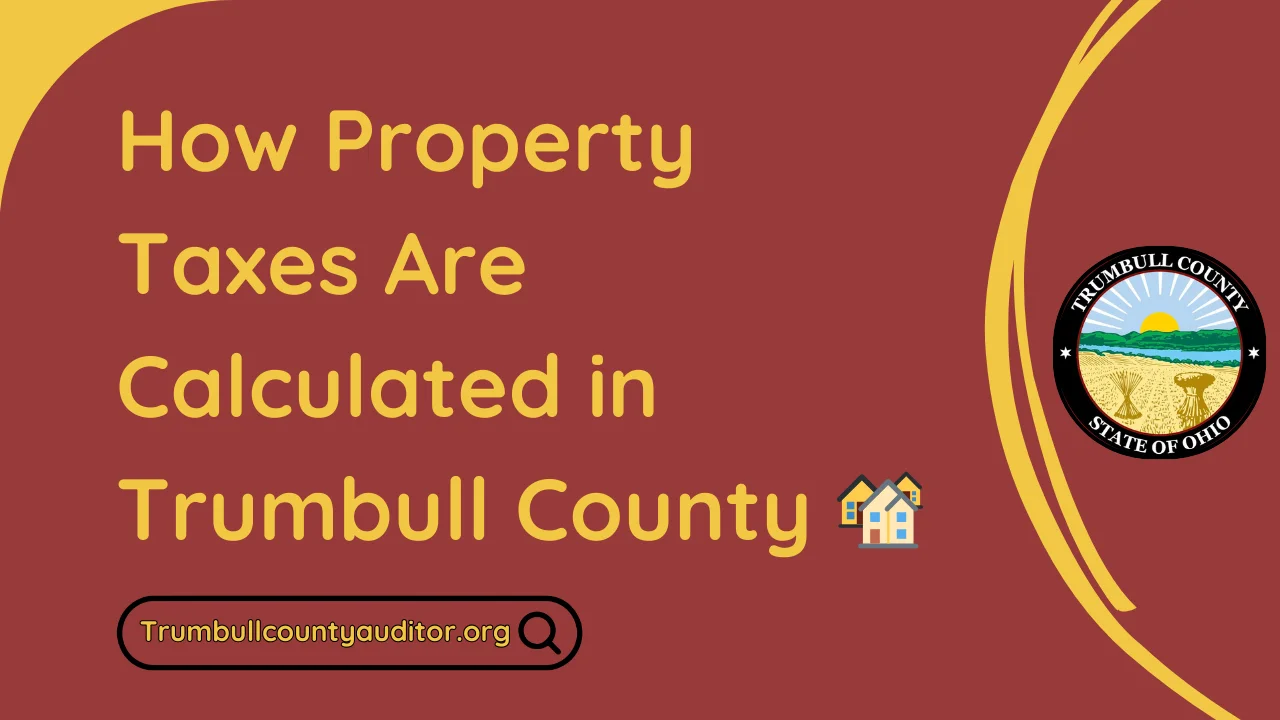Trumbull County’s property tax system is a key source of income. The median tax rate is 2.20%. On average, residents pay $1,406 in property taxes each year, which is less than the national average.
The Trumbull County Auditor’s office oversees property tax assessments and collections. Tax rates change depending on where you are in the county.
Property values in Trumbull County are updated every six years. There are also three-year updates in between. The cost to appraise a property is between $15 and $25.
Residential property appraisals take 2-3 days and cost about $500. The tax assessment in Trumbull County is based on the property’s market value. Rates can vary for different types of properties.
Trumbull County Property Tax System
Trumbull County is in northeastern Ohio near to Cuyahoga county. It has a detailed property tax system run by the Trumbull County Auditor’s Office. Martha C. Yoder leads the office, which handles property records, tax info, and GIS data for over 144,000 properties.
Role of the County Auditor’s Office
The Trumbull County Auditor’s Office is at 160 High Street in Warren, OH 44481. It’s open from 8:30 AM to 4:30 PM, Monday through Friday. This office is key in assessing property values and collecting taxes, making sure the county’s property tax system works well.
Property Assessment Overview
In Trumbull County, property values are determined through field checks, aerial photos, MLS data, and local auction records. These steps help figure out the tax assessed value. This value is usually less than the actual market value because of exemptions for primary homes and agricultural land.
Tax Collection Process
Property taxes in Trumbull County are collected twice a year, in the spring and fall. These taxes pay for important services like schools, road upkeep, and emergency services. The county’s median property tax rate is 1.84%, higher than the national and Ohio state medians.
| Statistic | Value |
|---|---|
| Median Property Tax Rate | 1.84% |
| Typical Annual Property Tax Bill | $1,518 |
| Median Home Value | $82,000 |
| Highest Median Tax Bill (Middlefield) | $2,624 |
| Lowest Median Tax Bill (Masury) | $908 |
Property Assessment Cycles and Timelines
Trumbull County regularly checks property values to keep them accurate. They assess properties every six years and update them every three years. This helps the county reflect market changes in property values.
The Trumbull County Auditor’s Office is always ready to assess properties. They check each property about every 2.5 years. These checks can be done quickly, usually in 2-3 days.
They use a method called mass appraisal, which costs between $15 to $25 per property. This method helps keep property values up to date.
| Assessment Timeline | Valuation Update Frequency | Assessment Method Cost |
|---|---|---|
| Every 6 years | Every 3 years | $15 – $25 per property |
This approach to property reassessment and assessment updates keeps Trumbull County’s property values accurate. Regular checks and updates help property owners understand their taxes. It also makes sure assessments are fair.
How Property Taxes Are Calculated in Trumbull County
Trumbull County’s property tax system is based on a property’s assessed value. This value is often lower than the market value because of exemptions. For example, primary residences and agricultural land get special treatment. The county looks at many factors to figure out property values.
Assessment Methods
The Trumbull County Auditor’s Office uses different methods to assess property values. They look at recent sales, the property’s condition, and its size. They also consider the property’s age and special features. This helps them set a fair assessed value for taxes.
Millage Rates and Tax Districts
Property tax rates in Trumbull County are shown as millage rates. One mill is $1 for every $1,000 in assessed value. The rate changes based on the tax district. For instance, the 44485 zip code has a median rate of 2.27%, while 44484’s is 2.20%.
Calculation Formulas
To find the property tax, the assessors multiply the market value by 0.35. This gives the assessed value. Then, they multiply this by the millage rate, which includes various levies. The final amount is the net tax due, which might be adjusted for special assessments or exemptions.
Property Valuation Methods and Approaches
The Trumbull County Auditor’s Office uses many methods to value properties fairly. They do field checks, look at aerial photos, and review MLS data. They also check local auction results to get accurate values.
They also value the need for professional appraisals. These cost about $500 and take 2-3 days. They give a detailed look at a property’s market value.
Valuation Techniques
- Field checks: Inspections of the property to gather accurate data on size, condition, and other key factors.
- Aerial photography: Aerial imagery analysis to assess property characteristics and changes over time.
- MLS data: Referencing real estate listings and sales information from the local Multiple Listing Service.
- Auction results: Considering recent auction prices for similar properties in the area.
- Professional appraisals: Obtaining expert property valuations from licensed appraisers.
The Trumbull County Auditor’s Office uses many property appraisal methods. This helps them give a full market value assessment for each property. They make sure the comparable sales analysis is fair for taxes.
| Valuation Method | Description | Typical Cost | Completion Time |
|---|---|---|---|
| Field Checks | Inspections of the property to gather accurate data | Included in Assessor’s duties | Varies |
| Aerial Photography | Analysis of aerial imagery to assess property characteristics | Included in Assessor’s duties | Varies |
| MLS Data | Referencing real estate listings and sales information | Included in Assessor’s duties | Varies |
| Auction Results | Considering recent auction prices for similar properties | Included in Assessor’s duties | Varies |
| Professional Appraisals | Obtaining expert property valuations from licensed appraisers | Approximately $500 | 2-3 days |
Tax Rate Structure and Millage Rates
Trumbull County’s property tax system is complex. It includes mill levies, district-specific rates, and special assessments. Knowing this helps property owners understand their taxes better.
Mill Levies
Mill levies are like one dollar for every $1,000 of taxable value. They are voted on by the public. They fund services like senior care and mental health.
For example, a new tax for senior services would cost $10 a year for a $100,000 house. It would add $1.2 million annually.
District-specific Rates
Trumbull County also has rates specific to certain districts. The Board of Developmental Disabilities has a 2.25-mill levy. It brings in nearly $7.8 million yearly.
The Mental Health and Recovery Board’s 1-mill levy raises $3.4 million annually. The Children’s Services 0.8-mill levy supports social services with about $2.7 million yearly.
Special Assessments
Property owners in Trumbull County may face special assessments. These are charges for specific improvements or services. They are different from the general property tax and can change based on location and service.
| Levy | Mill Rate | Annual Revenue |
|---|---|---|
| Trumbull County Senior Services | New tax | $1.2 million |
| Trumbull County Board of Developmental Disabilities | 2.25 mills | $7.8 million |
| Mental Health and Recovery Board | 1 mill | $3.4 million |
| Trumbull County Children’s Services | 0.8 mills | $2.7 million |
Available Tax Exemptions and Deductions
Trumbull County has several property tax exemptions and deductions for eligible residents. These can help you save a lot on your annual tax bill. It’s key to know what options you might have.
Homestead Exemption
The Homestead Exemption lets homeowners with qualifying homes exempt up to $25,000 of their home’s value from local property taxes. You must be 65 or older, disabled, or the surviving spouse of someone who was 59 or older when they passed away.
Agricultural Use Valuation
If your land is for farming, you might get the Agricultural Use Valuation. This program values your land for farming, not its full market value. This usually means a lower tax bill.
To get these exemptions and deductions, you need to apply to the Trumbull County Auditor’s Office. Deadlines and rules can change, so apply on time and stay informed.
Understanding and using Trumbull County’s property tax exemptions and deductions can save you a lot. It ensures you only pay what you should and can save you hundreds or thousands each year.
The Role of Market Value in Tax Assessment
In Trumbull County, property taxes are based on a property’s market value. Assessors look at recent sales of similar properties to set fair values. This keeps property taxes in line with the current market.
Recent Sales Data Impact
Trumbull County uses the latest sales data to figure out a property’s value. Assessors look at these sales to understand a property’s worth. This ensures taxes are fair for everyone.
Property Condition Considerations
The property’s condition also matters in assessment. Owners can show evidence of needed repairs or issues. Assessors consider these when setting the final value.
Trumbull County reassesses properties regularly. This keeps values up to date, ensuring fair taxes for everyone. By looking at sales data and property condition, the county makes sure taxes reflect a property’s true value.
Property Tax Collection and Due Dates
In Trumbull County, property taxes are split into two parts. They are due on December 31 and June 20. But, these dates can shift to January or February and July or August. This depends on the year and local rules.
It’s very important to pay your property taxes on time. A 5% penalty is added if you don’t pay by the due date. This penalty jumps to 10% if you wait more than ten days. Interest also starts on December 1 of the next year if you’re late.
The county’s Auditor’s and Treasurer’s offices team up to collect taxes efficiently. They also offer a way to check property information online.
Trumbull County has important dates for property taxes. These include January 1 for real property tax liens, and December 31 to February for the first payment. The second payment is due on June 20 to July, with a final deadline in August. If taxes aren’t paid, delinquent lists are published after each deadline.



